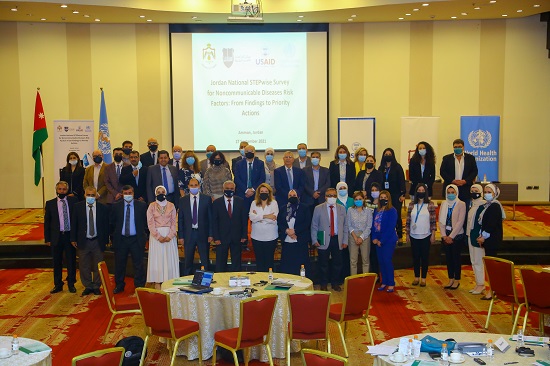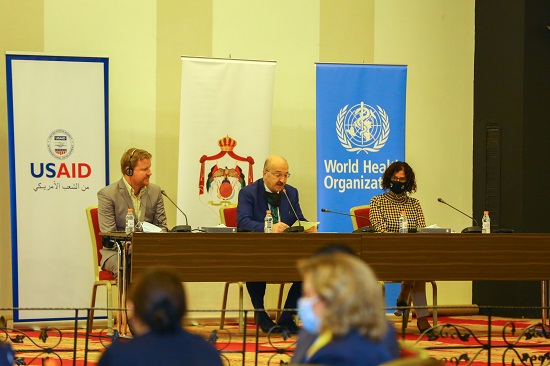In her opening speech, acting WHO Representative to Jordan Dr Jamela Al Raiby pointed to the increasing rates of morbidity and mortality due to NCDs and their associated risk factors globally and in Jordan alike. She stressed the possibility of preventing NCDs and mitigating their impact on public health through active involvement of all sectors and through an integrated governmental and societal approach. She emphasized, "It is very important to translate the results and recommendations of the latest national STEPwise survey into actionable interventions in line with updated scientific evidence and approved health standards," highlighting the importance of identifying the needs necessary to effectively implement these measures effectively, in coordination with all relevant partners.
On his part USAID Public Health Office Director John Mckay said, "USAID is proud to support the Ministry of Health to promote healthy lifestyles and public health in Jordan. We value our longstanding partnership with the Government of Jordan by collecting and analysing key data needed for decision-making in the health sector." He continued, "NCDs are risk factors for COVID-19, which highlights the need for a preventive approach that cannot be addressed unless accurate data of the risk factors are available. This validates the importance of this survey and data in implementing smart policy measures to reduce disease incidence and deaths in Jordan."
 Dr Zaid Eyadat, Vice President of International Affairs, Quality and Accreditation at the University of Jordan and Director of the Centre for Strategic Studies pointed out in his speech the importance of joint cooperation between research centres, government institutions and international organizations in the fields of health research to guarantee the highest levels of professionalism in the practical and research application of studies whose outputs form the basis for NCD plans and decisions at the national level. In the field of public policies, the Centre established the Public Policy Forum which tackles several areas. Dr Eyadat affirmed that the Centre looked forward to more partnerships with various governmental and international parties to work on studies that achieve the public benefit of citizens and the Jordanian state.
Dr Zaid Eyadat, Vice President of International Affairs, Quality and Accreditation at the University of Jordan and Director of the Centre for Strategic Studies pointed out in his speech the importance of joint cooperation between research centres, government institutions and international organizations in the fields of health research to guarantee the highest levels of professionalism in the practical and research application of studies whose outputs form the basis for NCD plans and decisions at the national level. In the field of public policies, the Centre established the Public Policy Forum which tackles several areas. Dr Eyadat affirmed that the Centre looked forward to more partnerships with various governmental and international parties to work on studies that achieve the public benefit of citizens and the Jordanian state.
The session included discussions between relevant partners to identify national priority strategic interventions for reducing NCDs in line with the 4 main areas stipulated in the regional framework for action to implement the United Nations Political Declaration on the Prevention and Control of NCDs, which Jordan is committed to achieving. These 4 areas are governance, prevention and reduction of risk factors, health care, and surveillance, monitoring and evaluation.








 27 September, 2021 Amman – Under the patronage of His Excellency the Minister of Health, Professor Feras Ibrahim Hawari, the Ministry of Health of Jordan organized, in collaboration with the World Health Organization (WHO), a meeting to discuss the situation of noncommunicable diseases (NCDs) in Jordan, in light of the results of the recent national survey. The survey monitors NCDs and their associated risk factors and was completed last year, in cooperation with the Center for Strategic Studies at the University of Jordan, with technical support from WHO, and funding from the United States Agency for International Development (USAID).
27 September, 2021 Amman – Under the patronage of His Excellency the Minister of Health, Professor Feras Ibrahim Hawari, the Ministry of Health of Jordan organized, in collaboration with the World Health Organization (WHO), a meeting to discuss the situation of noncommunicable diseases (NCDs) in Jordan, in light of the results of the recent national survey. The survey monitors NCDs and their associated risk factors and was completed last year, in cooperation with the Center for Strategic Studies at the University of Jordan, with technical support from WHO, and funding from the United States Agency for International Development (USAID).